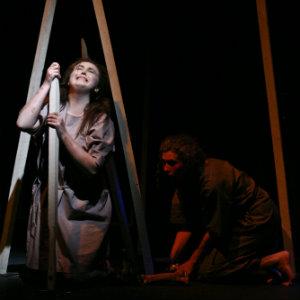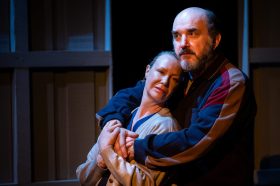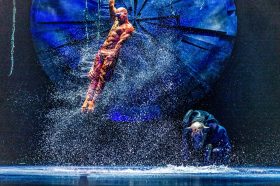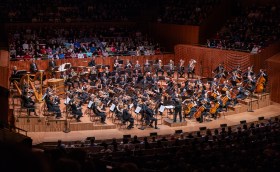Gibson has invented a mythology of her own, setting the action of Widowbird in an indeterminate ancient place and time; and cites Sophocles’ Theban play, Antigone, Joan of Arc, and A Thousand and One Nights as inspirations. While Widowbird is not a facsimile of Antigone, it does feature a strong female central character: Atajarah, the woman whose tears have healing properties.
Atajarah travels from her village of Want to offer help to the King, and Darius, his alchemist. She seeks to help all humanity, including her own villagers, who are dying of the scourge. Darius and the King force her to heal wounded soldiers who are at war with the villagers, thus creating an immortal army that cannot be vanquished. Atajarah’s power to heal is abused and drained by Darius and the King and when she finally returns to her village, it is in ruins, and there are few survivors.
The common definition of a tragedy is the fall of a great man. Widowbird is about the fall of a great woman. In the first act, Atajarah seeks to heal. In the second act, her healing power is gone and she has borne a daughter, Asatira, whom she shields from the world in order to save her from a similar fate. In doing so, Atajarah falls from grace, becoming an oppressor instead of a healer.
The cast includes a storyteller who functions as a Greek chorus. At times, the storyteller narrates what is already obvious by the action, but Leith Arundel and Alison McGregor share this role and chronicle the story with the right level of solemnity and authority.
Joanna Richards and Leith Arundel share the weight of performing young and old Atajarah respectively, with Arundel being the most convincing. Stephen Fitzgerald pays live music at the back of the stage and this greatly adds to the mood and pace of the play.
I had imagined that the story of a weeping healer would be a lighter fable, more ethereal, but I found the play heavy going and too intense for my taste. It would best be viewed by those who want to see a new take on a Greek tragedy.
Rating: Three stars out of five.
Widowbird
By Emma Gibson
Director: Joanne Schultz
Design: Christiane Nowak
Lighting Design: Alister Emerson
Music and Sound Design: Stephen Fitzgerald
Stage Combat: Dene Kermond
Cast: Leith Arundel (Old Atajarah, Espina, Storyteller), Raoul Craemer (Darius), Dene Kermond (King, Baijan, soldiers), Alison McGregor (Fortina, Storyteller), Joanna Richards (Young Atajarah, Asatira)
Running time: 90 mins (plus interval)
The Street Theatre, Canberra
September 8 – 16





